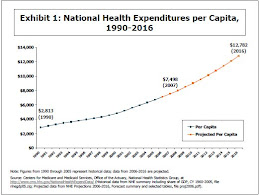I definitely believe that there are many factors that contribute to the increase in national health spending per capita. I mean there are a lot of people without insurance that use the emergency room for primary care. By this time, the patient has probably let the problem get bad enough to even obtain medical attention and at this time it probably cost a ridiculously amount of money. We also need to consider the cost of insurance. The cost of insurance is progressively increasing each year. Not only is the premium expensive, but the co-pay is also increasing. These problems really hit families with low SES. Going on with insurance, HMOs are very inefficient. For example, I needed to see an allergist. So I had to go to my primary care provider, pay a $30 co-pay, the doctor put in a request for a referral, I then had to come back to my primary care provider to provide a blood sample (costing another $30 co-pay), and then 2 weeks later finally got approved to see an allergist (which is another $30 co-pay). Summary: 2 weeks later, 2 primary care providers, and $90àjust for a referral. GAAHHHH! This was a very very inefficient process. New developments in technology also contribute to the increase cost of per capita health spending. As more research, time, and money are spent to develop new medical procedures, the costs of these procedures are extremely expensive.
In the current recession, less people will be uninsured. Less people will be going to get treatment meaning more people being untreated and letting their illness worsen. The government needs to put more emphasis on healthcare. If the state and national government sets healthcare as a priority and increase the budget, then more people will be able to seek medical assistance.

Christine's recent medical escapade of having to visit and then revisit her primary health care provider, just to attain a referral all while her health care issue remained unattended for 2 weeks is a great example of the inefficiency on which our current health care system is running. Obviously I don’t know the whole story, but it seems as though she should have been given a referral to the specialist after her initial visit. It would have been a lot less time consuming. In addition, the amounting co-pays totaling $90 that she experienced is a drop in the bucket compared to what is going on nation wide for the millions of Americans. Much of these co-pays are granted because they are a way to cover rising costs, labor, etc yet there those instances where it seems as though the process is just an easy way for insurance companies and providers to make a quick profit. Advances in technology have brought about a dramatic rise in health spending and it must be covered in some way…..hence more frequent and higher co-pays. However, as in Christine’s case is it really necessary to keep charging her co-pays just to get a referral instead of sending her directly to a specialist?
ReplyDelete